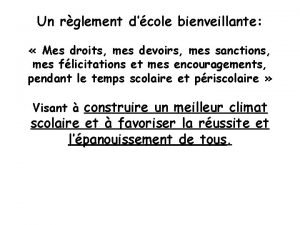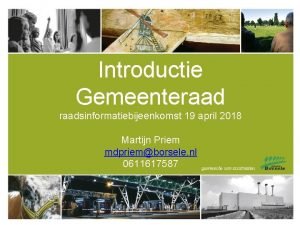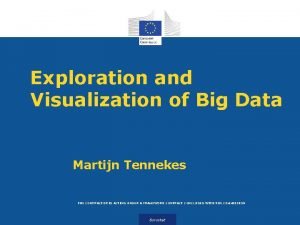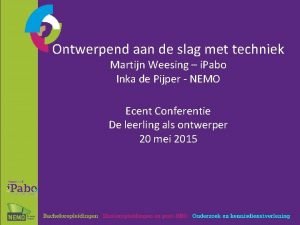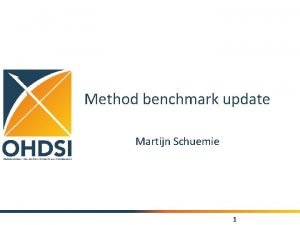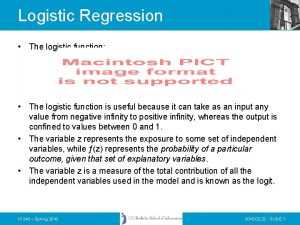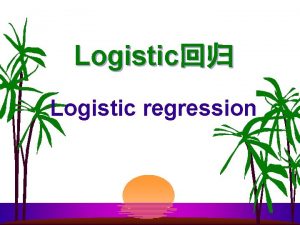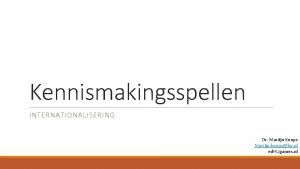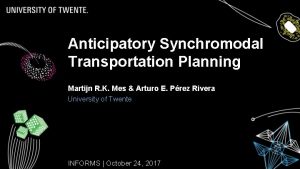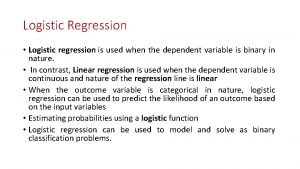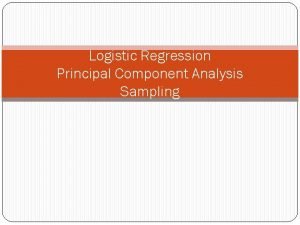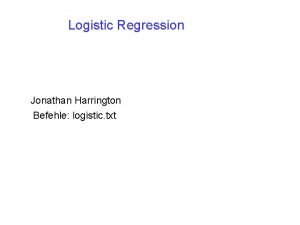ANTICIPATO RY LOGISTIC S MARTIJN MES IN THIS














- Slides: 14

ANTICIPATO RY LOGISTIC S MARTIJN MES

IN THIS PRESENTATION: 1. INTRODUCTION 2. EXAMPLE 1: WASTE COLLECTION 3. EXAMPLE 2: AVIATION POLICE 4. 5. EXAMPLE 3: IMPACT SYNCHROMODAL TRANSPORT

1. INTRODUCTIO N

INTRODUCTION TEACHING • My research: • • • DHL (Logistics Trends Radar 2016) predicts 3 logistics trends: • • • Sustainable logistics, city logistics, emergency logistics Increase transport efficiency through dynamic, real-time, and anticipatory planning, taking into account transport externalities (emissions, congestion, safety) Self-driving and unmanned vehicle technology The Internet of Things (Io. T) Logistics driven by AI and machine learning: • Anticipatory logistics and self-learning systems (AL) AL: predictive algorithms running on (big) data to enhance planning and decision-making, process efficiency, service quality (delivery times) AL examples in this presentation: • Waste collection • Aviation police • Synchromodal transport 1 |

2. EXAMPLE 1: WASTE COLLECTION

DYNAMIC WASTE COLLECTION • Twente Milieu: • One of the largest waste collectors in the Netherlands • Shift towards underground containers, equipped with motion sensors • Shift from a static to a dynamic planning methodology: select containers based on their estimated fill levels • Inventory Routing Problem: when to deliver which customer? • Approach: • Heuristic equipped with a number of tuneable parameters to anticipate changes in waste disposals • Parameter settings may be time-dependent and might change over time • Learn parameters through simulation (offline learning) or in practice (online learning) • Methodologies: heuristic methods; simulation optimization, Optimal Learning, Ranking & Selection, Bayesian Global Optimization (BGO) 2 |

3. EXAMPLE 2: AVIATION POLICE

ANTICIPATORY PLANNING OF POLICE HELI’S • Integrated tactical and operational planning of police helicopters in • • • anticipation of unknown incidents to maximize the “coverage” Forecast: • Generalize historical incidents in time and space, put more emphasis on recent observations, and combine with intelligence Operational decision - when and where to fly and standby: • Matheuristic: exact solution for one helicopter with given departure time Tactical decision - division of flight budget, personnel, and standby strategies to days and shifts: • Hourly configurations (#flying heli’s, #standby heli’s, standby locations) • Configurations subject to various restrictions, predefined routes, and given coverage for each configuration per hour • Shift configurations consisting of a given sequence of hourly configurations (several thousands of possible shift configurations) • Solve ILP exactly to determine best shift configuration for each shift 3 |

4. EXAMPLE 3: SYNCHROMODAL TRANSPORT

SYNCHROMODAL TRANSPORT Today Tomorrow ? Day-after 4 |

SYNCHROMODAL TRANSPORT Today Tomorrow ? Day-after Approach: Approximate Dynamic Programming combined with Optimal Learning techniques (efficient information collection), for offline and online learning 4 |

5. IMPACT

IMPACT Illustration Science • Anticipatory and dynamic planning • Adaptive systems and optimal learning • Gamification Practice 20% 25% Heuristics Mathematical programming Matheuristics Approximate Dynamic Programming • Value Function Approximation • Bayesian Learning (VPI/KG) • Bayesian Global Optimization • • ? 5 |

QUESTIONS?
 Tasso nominale convertibile esercizi
Tasso nominale convertibile esercizi Postaprevidenza valore riscatto anticipato modulo
Postaprevidenza valore riscatto anticipato modulo Wsdisplays
Wsdisplays Frida kahlo mes grands parents et moi
Frida kahlo mes grands parents et moi Fiche frida kahlo
Fiche frida kahlo Mes droits et mes devoirs à l'école
Mes droits et mes devoirs à l'école Dieu que tes eaux vives paroles
Dieu que tes eaux vives paroles Martijn priem
Martijn priem Martijn tennekes
Martijn tennekes Martijn van der heide
Martijn van der heide Martijn weesing
Martijn weesing Martijn schuemie
Martijn schuemie Martijn tennekes
Martijn tennekes Tim van iersel
Tim van iersel Martijn schuemie
Martijn schuemie





